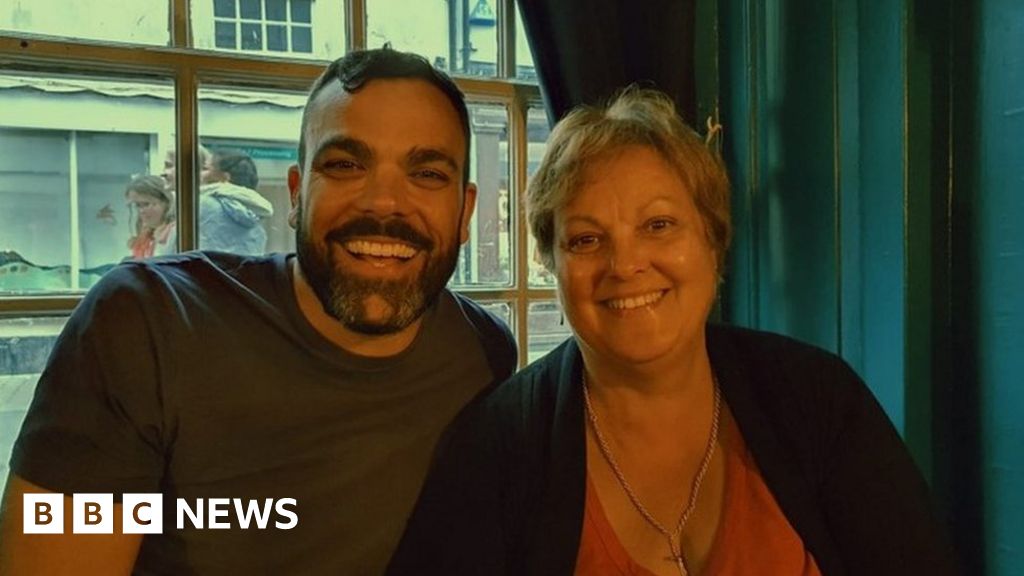- By Rachel Candlin
- BBC News
Image source, Brain Tumour Research
Elly Monaghan died in July, 14 months after her brain tumour was discovered
The son of a woman who appeared as if “she was drunk” but later died of a brain tumour is raising awareness of the disease.
A scan showed Elly Monaghan, 70, from Bridgwater, had suffered a bleed on the brain, caused by the growth.
“She was slurring her words and seemed confused,” said her son, Pete Monaghan.
Mr Monaghan, 42, is taking part in the 100 a Day Your Way challenge to raise money for Brain Tumour Research (BTR).
‘Something wasn’t right’
Ms Monaghan was getting ready for a day at the rugby in March 2022, when her son phoned her and was concerned to hear that her speech was slow and she sounded confused.
“I asked if Dad was there and, after Mum passed the phone to him, I asked jokingly if she had been drinking, to which he said ‘no’,” said Mr Monaghan. “We knew something wasn’t right.”
The next day, Ms Monaghan was taken to Musgrove Park Hospital, in Taunton, and following tests it was confirmed that she had a glioblastoma.
An operation was followed by radiotherapy, and one full round of gruelling chemotherapy treatment.
However, by December last year her platelet count was too low and the family were told by doctors that no further treatment was available and the disease would eventually take her life.
Image source, Brain Tumour Research
Mr Monaghan said he knew something was not right with his mother when she slurred her words and appeared as if “she was drunk”
“We felt upset and frustrated,” said Mr Monaghan. “Every question we asked the medical team seemed to come back with the same disappointing response.”
In March this year, a scan showed Ms Monaghan’s tumour had spread to two different areas on her brain meaning further surgery was not an option.
“That was quite tough, because that was the point at which she went downhill quite rapidly and she lost her mobility,” said Mr Monaghan.
“She ended up in a wheelchair, which stopped her doing the things that she liked doing. That was the point at which we realised that she was ill and it wasn’t going well.”
Ms Monaghan died at home in July, 14 months after the tumour was diagnosed.
Image source, Brain Tumour Research
Pete Monaghan is taking part in the 100 a Day Your Way challenge during November in memory of his mother and to raise money for Brain Tumour Research
Just 1% of the national spend on cancer research has been allocated to brain tumours since records began in 2002, BTR says.
BTR is calling on the government to ring-fence £110m of current and new funding to kick-start an increase in the national investment to £35m a year by 2028.
Mr Monaghan has signed up to the 100 a Day Your Way to raise money and to increase awareness.
“Lots and lots of young people get brain tumours and the more research you do, the more you find this disease doesn’t discriminate on age,” he said.
“I don’t think it’s good enough that this disease isn’t on a par with all the other cancers.”
The challenge takes place throughout November and requires participants to complete either 100 squats, star jumps, sit ups, 100 seconds of a plank, or a combination of all four exercises each day.
Mr Monaghan is also campaigning to help the charity reach 100,000 signatures on its petition to increase research funding, in the hope of prompting a parliamentary debate.
Image source, Brain Tumour Research
Elly Monaghan (front left) died in July, 14 months after her brain tumour was diagnosed

Sarah Carter is a health and wellness expert residing in the UK. With a background in healthcare, she offers evidence-based advice on fitness, nutrition, and mental well-being, promoting healthier living for readers.








